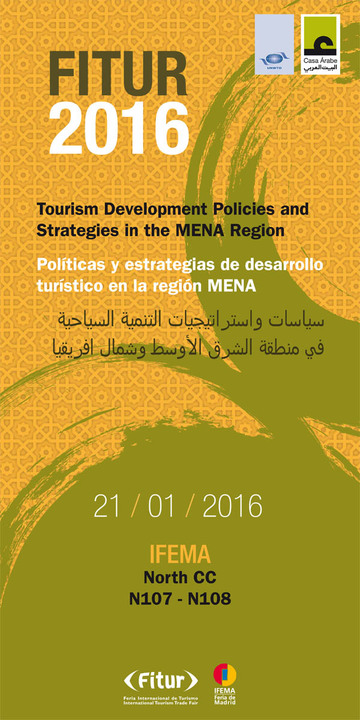Conferences and debates
Index / Activities / Conferences and debates / Policies and Strategies for Tourism Development in the MENA Region
Policies and Strategies for Tourism Development in the MENA Region
January 21, 2016From 4:00 to 5:30 p.m.
MADRID
IFEMA. Northern Pavilion. Room N107/108
From 4:00 to 5:30 p.m.
Free entry after required registration.
You may register at http://middle-east.unwto.org/webform/ministerial-round-table
The entrance to the North Pavilion at Ifema, where the event will be taking place, is open to the public (you do not need an entrance pass to Fitur 2016).
The entrance to the North Pavilion at Ifema, where the event will be taking place, is open to the public (you do not need an entrance pass to Fitur 2016).
In English, with simultaneous translation into Spanish and Arabic.
Casa Árabe and the UNWTO have organized this round table discussion at
FITUR 2016, with participation by Tourism Ministers from countries in
the Middle East and North Africa.
Casa Árabe and the World Tourism Organization (UNWTO) have organized this fourth edition of a ministerial round table discussion on “Tourism Development Policies and Strategies in the MENA Region: Sustaining Growth through Shocks,” with the support of IFEMA and Fitur 2016, as part of the Fitur International Tourism Trade Fair of 2016.
The debate taking place will analyze current trends and short-terms prospects for tourism in the region -within the context of a regional state of turmoil and the persistent uncertainty about world economic prospects-, as well as the strategies and measures to be implemented in order to improve security in the tourism industry, to accelerate and strengthen the sector’s recovery and sustained growth, to promote the competitiveness of tourist destinations and to promote investments.
This year, participating in the debate for the first time are the Ministers of Tourism of Algeria, Jordan and Sudan, in addition to the Tourism Ministers of Morocco, Lebanon and Palestine. The event will be officially opened by the Secretary General of the UNWTO, Taleb Rifai, the State Secretary of Foreign Affairs, Ignacio Ybáñez Rubio, the Director General of Turespaña, Marta Blanco Quesada, and Pedro Villena, the General Director of Casa Árabe.
Despite the conflict existing in certain countries and the global challenges being experienced by the tourism industry, tourism in the Middle East grew by 5.3% during the first ten months of 2015, leading growth worldwide compared with other regions such as Europe (5.1%) and the Americas (4.7%), thereby consolidating the recovery which began in 2014, according to UNWTO data. However, this growth was negative in North Africa, where arrivals fell by 10%, having been affected by the instability and security problems in certain countries, especially Tunisia, Libya and Egypt.
Event program (in English, Spanish and Arabic).
The debate taking place will analyze current trends and short-terms prospects for tourism in the region -within the context of a regional state of turmoil and the persistent uncertainty about world economic prospects-, as well as the strategies and measures to be implemented in order to improve security in the tourism industry, to accelerate and strengthen the sector’s recovery and sustained growth, to promote the competitiveness of tourist destinations and to promote investments.
This year, participating in the debate for the first time are the Ministers of Tourism of Algeria, Jordan and Sudan, in addition to the Tourism Ministers of Morocco, Lebanon and Palestine. The event will be officially opened by the Secretary General of the UNWTO, Taleb Rifai, the State Secretary of Foreign Affairs, Ignacio Ybáñez Rubio, the Director General of Turespaña, Marta Blanco Quesada, and Pedro Villena, the General Director of Casa Árabe.
Despite the conflict existing in certain countries and the global challenges being experienced by the tourism industry, tourism in the Middle East grew by 5.3% during the first ten months of 2015, leading growth worldwide compared with other regions such as Europe (5.1%) and the Americas (4.7%), thereby consolidating the recovery which began in 2014, according to UNWTO data. However, this growth was negative in North Africa, where arrivals fell by 10%, having been affected by the instability and security problems in certain countries, especially Tunisia, Libya and Egypt.
Event program (in English, Spanish and Arabic).

